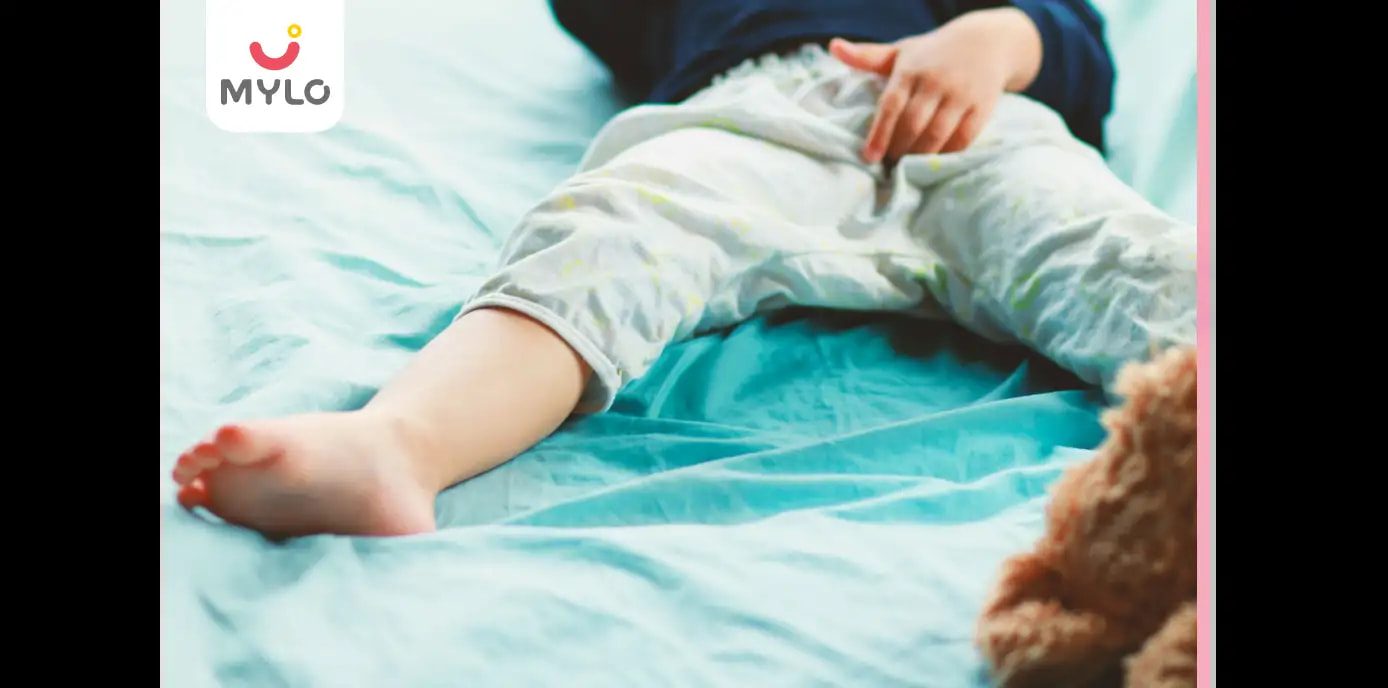Get MYLO APP
Install Mylo app Now and unlock new features
💰 Extra 20% OFF on 1st purchase
🥗 Get Diet Chart for your little one
📈 Track your baby’s growth
👩⚕️ Get daily tips

OR


Article Continues below advertisement
- Home

- Symptoms & Illnesses

- Bedwetting (Nocturnal Enuresis): Causes, Symptoms & Treatment
In this Article
- What are the reasons for bedwetting?
- Symptoms of bedwetting
- Causes of bedwetting
- Small bladder
- Inability to identify a full bladder
- Hormonal imbalance
- Urinary tract infection
- Sleep apnea
- Diabetes
- Structural problem in urinary tract or nervous system
- Chronic constipation
- Risks of bedwetting
- Stress and anxiety
- ADHD
- Family history
- Complications in bedwetting
- What is the treatment for bedwetting?
- Moisture alarms
- Lifestyle changes
- Alternative medicine
- Medications
Symptoms & Illnesses
Bedwetting (Nocturnal Enuresis): Causes, Symptoms & Treatment
Updated on 25 April 2023
Bedwetting or nocturnal enuresis is involuntary urination while sleeping at an age when staying dry can be reasonably expected. Soggy pajamas, wet sheets and an embarrassed kid are familiar scenes in many homes. But there’s no need to worry as is often a normal part of development.
In this article, we will discuss the causes of bed wetting, its symptoms, complications and treatment.
What are the reasons for bedwetting?
There can be several reasons for bedwetting among both children and adults. As children are still learning bladder control, nocturnal enuresis can be more common before age 6. Additionally, if a child or even an adult is dealing with a stressful condition or trauma, they are at a higher risk for bedwetting.
Article continues below advertisment
Sometimes, adults or children may wet their beds because of an underlying medical or psychological condition. Bedwetting can also be caused because of genetics. We will discuss the causes of bed wetting in more detail further.
Symptoms of bedwetting
Bedwetting is most common among children between the ages of 4 to 7. Here are some of the common symptoms of nocturnal enuresis:
-
Waking up with wet pajamas and sheets
-
Smell of pee from clothes and bedding
-
Feeling embarrassed and ashamed
Article continues below advertisment
-
Trying to hide wet clothes and sheets from others
-
Avoiding social interactions like sleepovers
Causes of bedwetting
Although there isn’t a definite cause for bedwetting, certain factors can play a role in this condition such as:
-
Small bladder
A child’s bladder may not be developed enough to hold the urine produced at night.
-
Inability to identify a full bladder
Sometimes the nerves that control the bladder may take time to mature and if a child is a deep sleeper, they may not wake up to pee even though their bladder is full.
Article continues below advertisment
-
Hormonal imbalance
Some children may not produce enough amounts of anti-diuretic hormone (ADH), responsible for slowing down nighttime urine production.
A urinary tract infection can make it hard for a child to control their urination. Signs and symptoms of UTI in kids can include bedwetting, frequent urination, daytime accidents, pain during urination and red or pink urine.
-
Sleep apnea
Sometimes nocturnal enuresis can be a sign of obstructive sleep apnea, which affects a child’s breathing during sleep often due to inflamed or enlarged tonsils. Other symptoms may include snoring and daytime drowsiness.
Bedwetting can also be an early sign of diabetes and is often accompanied by passing large amounts of urine, increased thirst, fatigue and weight loss despite good appetite.
-
Structural problem in urinary tract or nervous system
Although rare, bedwetting may also be related to a defect in the child’s neurological system or urinary system.
Article continues below advertisment
-
Chronic constipation
The same muscles control the elimination of urine and stool. That’s why in case of long-term constipation, these muscles may become dysfunctional and lead to bedwetting.
Risks of bedwetting
Nocturnal enuresis can affect anyone but it is twice as common in boys compared to girls. Several factors can increase a person’s risk of bedwetting, including:
-
Stress and anxiety
Stressful events like starting a new school, getting a little sibling or sleeping at someone else’s home can trigger bedwetting.
Children who have attention-deficit/hyperactivity disorder are more likely to experience bedwetting.
-
Family history
If one or both parents of a child experienced nocturnal enuresis in their childhood, then their child is also likely to experience bedwetting.
Article continues below advertisment
Complications in bedwetting
While bedwetting can be frustrating, without a physical cause it doesn’t pose any health risks. However, nocturnal enuresis can create some complications for a child such as:
-
Embarrassment and guilt which may lower their self-esteem
-
Loss of social interaction opportunities like sleepover or camp
-
Sleeping in wet clothes or sheets may cause rashes on the child’s bottom or genital area
What is the treatment for bedwetting?
Most kids outgrow bedwetting on their own but if your child needs any additional help, here are some options for bed wetting treatment:
Article continues below advertisment
-
Moisture alarms
Moisture alarms are battery-operated devices that connect to a moisture-sensitive pad on the child’s clothing or bedding. The moisture alarm sounds as soon as the child begins to urinate to help wake them up and get to the washroom. Moisture alarms can take at least 1-4 months to treat bedwetting.
-
Lifestyle changes
Lifestyle changes such as limiting fluids in the evening, discouraging caffeine, encouraging double voiding (urinating at the start of the bedtime routine and once again just before sleeping) and promoting the use of the toilet throughout the day can help reduce the bedwetting incidents.
-
Alternative medicine
You may also try a non-conventional approach such as acupuncture, hypnosis, chiropractic therapy and herbal therapy along with other treatments to combat bedwetting.
-
Medications
Your doctor may recommend some medications to the child as a last resort to stop nocturnal enuresis. Medications like desmopressin can reduce nighttime urine production while drugs such as oxybutynin can help reduce bladder contractions and increase its capacity.
Sometimes a combination of treatments can be the most effective way to treat bedwetting. However, if bedwetting is a symptom of some other underlying condition, it’s best to identify and treat that condition.
Article continues below advertisment



Written by
Anupama Chadha
Anupama Chadha, born and raised in Delhi is a content writer who has written extensively for industries such as HR, Healthcare, Finance, Retail and Tech.
Read MoreGet baby's diet chart, and growth tips

Related Articles
Understanding RSV And Its Long-Term Impact On Lung Health In Preterm Infants
Preventing Respiratory Syncytial Virus (RSV) In Preemies: Essential Steps For New Parents
How Respiratory Syncytial Virus (RSV) Impacts Premature Babies Differently: What Every Parent Needs To Know
Adverbs: A Comprehensive Guide to help small children learn the usage of adverbs
Related Questions
Influenza and boostrix injection kisiko laga hai kya 8 month pregnancy me and q lagta hai ye plz reply me

Hai.... My last period was in feb 24. I tested in 40 th day morning 3:30 .. That is faint line .. I conculed mylo thz app also.... And I asked tha dr wait for 3 to 5 days ... Im also waiting ... Then I test today 4:15 test is sooooo faint ... And I feel in ma body no pregnancy symptoms. What can I do .

Baby kicks KB Marta hai Plz tell mi

PCOD kya hota hai

How to detect pcos

Related Topics
RECENTLY PUBLISHED ARTICLES
our most recent articles
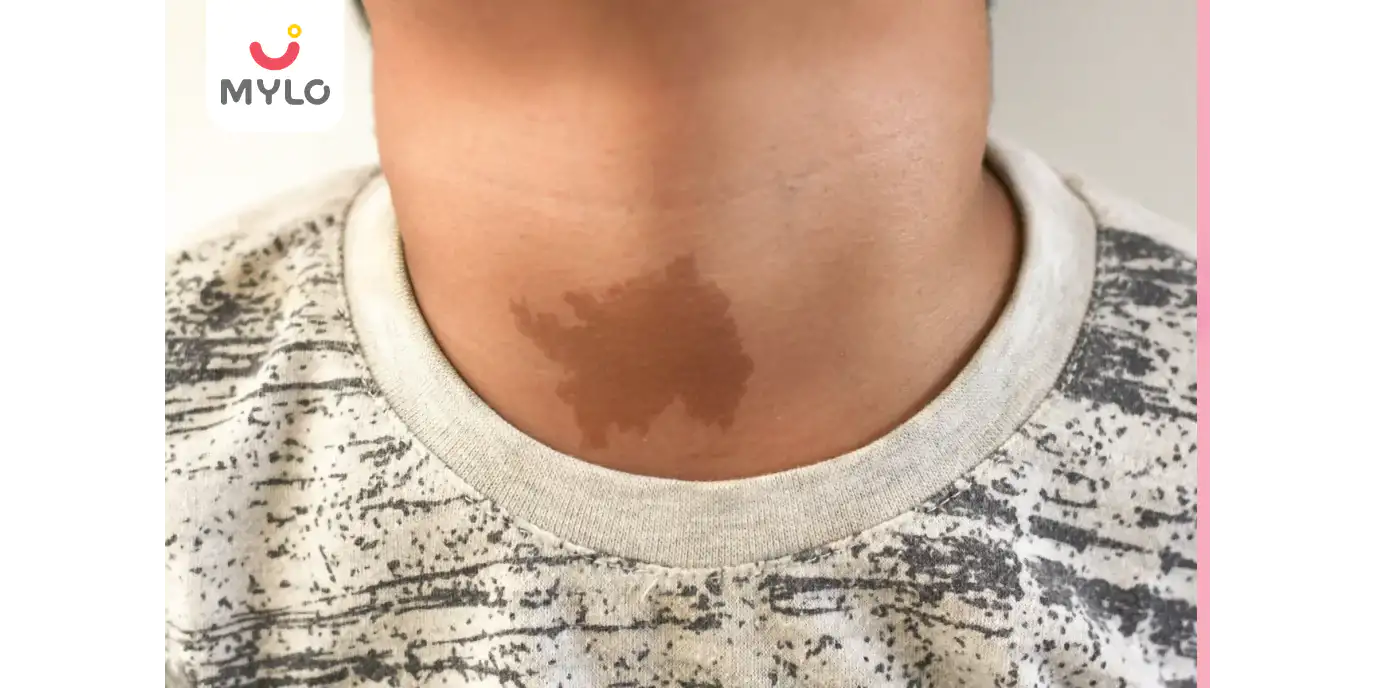
Skin Changes
Birthmark: Types, Causes, Risks & Treatment
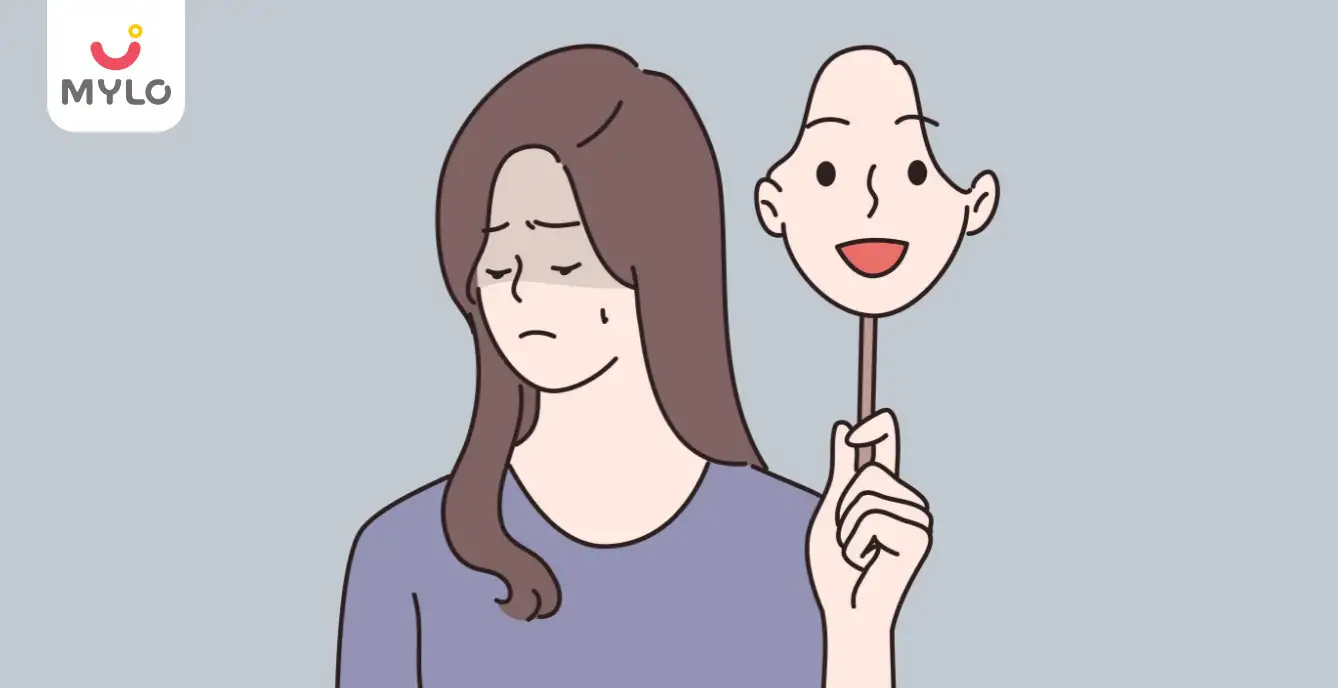
Emotions & Behaviour
Behaviour Therapy: Benefits, Types & Techniques
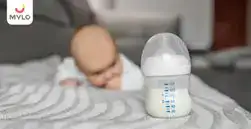
Feeding Schedule
How Long Does Breast Milk Last at Room Temperature?
Home Remedies
Thrush: Causes, Symptoms, Treatment, and More
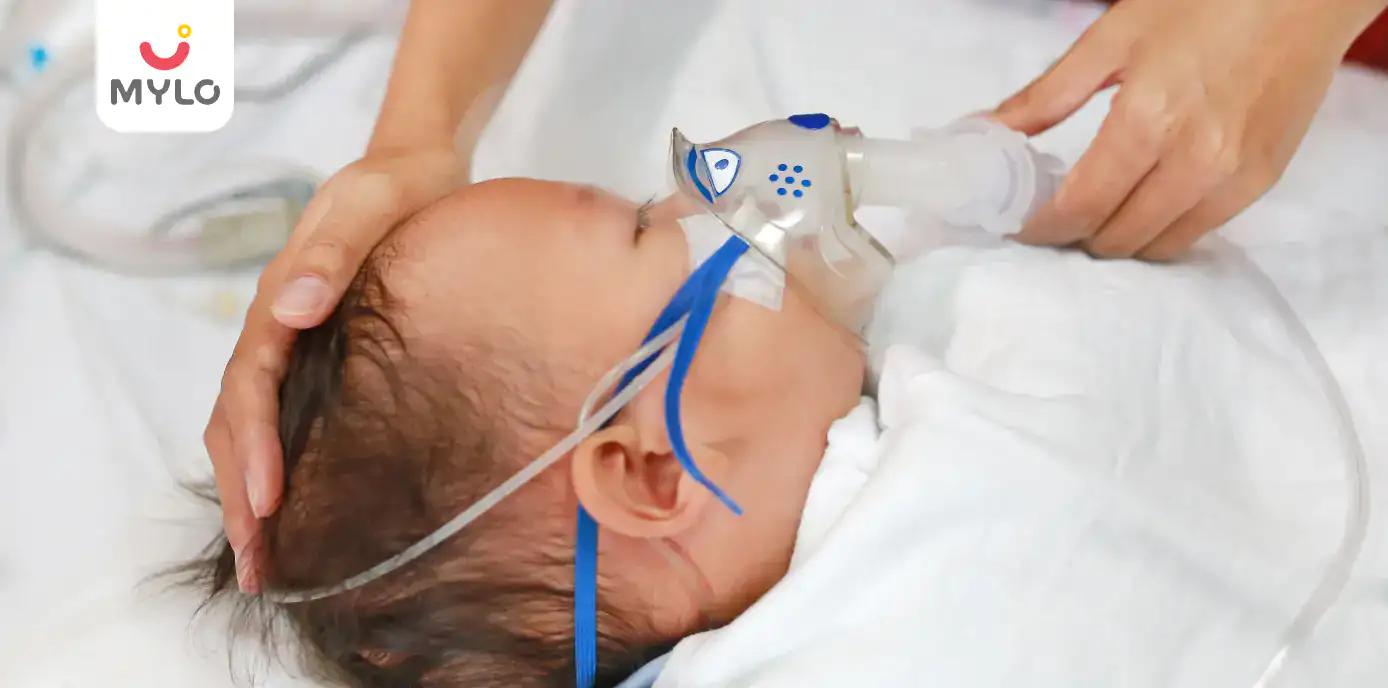
Illnesses & Infections
Childhood Asthma: Symptoms, Causes & Treatment
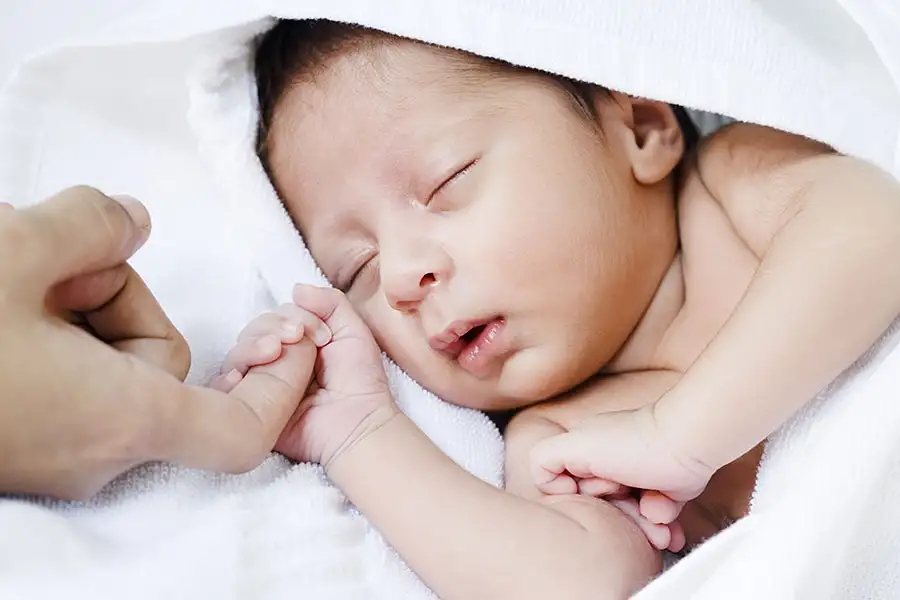
Feeding
Reflux in Baby: Symptoms, Causes & Treatment
- Pre Eclampsia: Meaning, Causes & Symptoms
- Baby Diarrhea: Causes, Symptoms & Treatment
- Bronchiolitis: Causes, Symptoms & Treatment
- Pelvic Pain in Pregnancy: Symptoms & Treatment
- Saliva During Pregnancy: Causes & Prevention
- Effective Ways to Treat Jaundice in Children: Expert Tips for a Speedy Recovery
- 10 Best Original Movies to Watch on Netflix
- Flu, Change of Season or New Covid Variant, XBB.1.16- What’s Causing These Symptoms?
- 5 Ways In Which Music Can Boost Your Baby's Brain Development
- How to Stop Baby Hiccups: Everything You Need to Know
- “Staying Active and Healthy: The Benefits of Safe Exercise During Pregnancy”
- Appendicitis In Pregnancy Symptoms, Diagnosis & Surgery
- 5 Common Myths Busted About Baby Sleep
- “Ectopic Pregnancy: All You Need to Know About This Complication”


AWARDS AND RECOGNITION
Mylo wins Forbes D2C Disruptor award
Mylo wins The Economic Times Promising Brands 2022
AS SEEN IN
















At Mylo, we help young parents raise happy and healthy families with our innovative new-age solutions:
- Mylo Care: Effective and science-backed personal care and wellness solutions for a joyful you.
- Mylo Baby: Science-backed, gentle and effective personal care & hygiene range for your little one.
- Mylo Community: Trusted and empathetic community of 10mn+ parents and experts.
Product Categories
baby carrier | baby soap | baby wipes | stretch marks cream | baby cream | baby shampoo | baby massage oil | baby hair oil | stretch marks oil | baby body wash | baby powder | baby lotion | diaper rash cream | newborn diapers | teether | baby kajal | baby diapers | cloth diapers |



